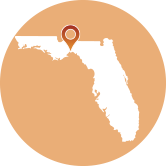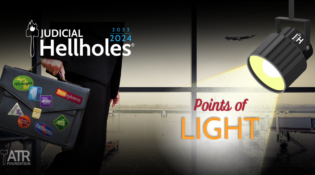FLORIDA SUPREME COURT REPEATEDLY EXPANDS LIABILITY
 The Florida Supreme Court’s liability-expanding decisions and contempt for the lawmaking authority of the state legislature has repeatedly led to its inclusion in this report. As discussed in last year’s report, in 2017, the issued several rulings that hurt Florida’s healthcare environment and allowed plaintiffs’ lawyers to hide questionable referral relationships with doctors. This year, the court was up to its usual antics.
The Florida Supreme Court’s liability-expanding decisions and contempt for the lawmaking authority of the state legislature has repeatedly led to its inclusion in this report. As discussed in last year’s report, in 2017, the issued several rulings that hurt Florida’s healthcare environment and allowed plaintiffs’ lawyers to hide questionable referral relationships with doctors. This year, the court was up to its usual antics.
BRINGING BACK JUNK SCIENCE
In 2013, Florida’s legislature brought state law on the admissibility of expert evidence in line with the federal courts and about two thirds of state courts. That law adopted the standard established by the 1993 decision of the U.S. Supreme Court in Daubert v. Merrell Dow Pharmaceuticals. The statute effectively deputizes judges as gatekeepers to ensure that expert testimony presented to jurors is indeed reliable and not “junk science.”
Unfortunately, the Florida Supreme Court rejected the Florida Legislature’s efforts to improve Florida’s expert witness standard. In DeLisle v. Crane, defendants challenged plaintiff ‘s expert’s testimony that plaintiff developed mesothelioma due to a combination of low-dose exposures to asbestos fibers in sheet gaskets (while working at a paper company) and the filters of Kent cigarettes (while smoking), among other sources. A Broward County jury returned an $8 million verdict. A mid-level appellate court, however, overturned the verdict, finding two of the plaintiff ‘s expert witnesses failed to meet the Daubert standard.
In a 4-3 opinion, the Florida Supreme Court held that Florida’s far weaker standard, which allows “pure opinion,” is the “appropriate test in the Florida courts.” As predicted in last year’s Judicial Hellholes report, the court used this asbestos-tobacco case as a means to find that, in requiring expert testimony to be based on sound science, the legislature encroached upon the court’s authority to set court rules.
ALLOWING BAD FAITH LIABILITY WITHOUT BAD FAITH
Another Florida Supreme Court ruling exposes insurers to liability far beyond the insurance policy limits purchased by the insured.
In Harvey v. Geico General Insurance Co., the court ruled in favor of a policyholder who killed a man in a car accident while covered under a $100,000 GEICO liability policy. GEICO tendered the policy limits in nine days, but the estate returned the check and sued the policyholder. A jury awarded the estate $8.5 million in a wrongful death judgment. After the judgment, the policyholder, who was 100% at fault in the accident, sued GEICO. He alleged that his insurer did not promptly inform him that the estate had asked for a statement of his financial resources. Had the estate received this information and seen that he lacked money to pay a large judgment, he claimed, the case may have settled.
An intermediate appellate court found that, at most, GEICO was negligent in handling the claim and that its actions did not cause the excess judgment. In a 4-3 ruling, however, Justice Peggy Quince reinstated the verdict, emphasizing that an insurer has a “duty to zealously represent customers against potential lawsuits.”
The decision required an insurer to pay over 8000% above an insured’s policy limits without evidence that the insurer had engaged in bad faith in processing a claim. Rulings like these mean higher insurance rates for Florida drivers. Florida Justice Reform Institute President William Large has called for the legislature to set “clear, objective standards in statute for avoiding bad faith while settling insurance claims.”
REDUCING EXCESSIVE AWARDS VIEWED AS AN IMPERMISSIBLE “CAP” ON DAMAGES
In September, the Florida Supreme Court reversed an appellate decision that reduced a $20 million verdict to $2 million, calling it an impermissible “cap on the amount of noneconomic damages.”
The award came about in a wrongful death action brought by the daughter of a lifelong smoker who died from lung cancer. The jury awarded her $6 million in compensatory damages, which was later reduced to $4.5 million in accordance with the jury’s finding that her mother was 25% at fault. As the plaintiff was a financially independent adult, these damages were for pain and suffering, not economic losses. The jury also awarded $14 million in punitive damages.
The Fourth District Court of Appeal concluded that “the relationship between an adult child living independent of their parent is simply not the type of relationship” that could justify a multi-million-dollar award. It observed that appellate courts had overturned similarly high awards to adult children of smoker.
Noting that an appellate court should only find an award excessive if it “shock[s] the judicial conscience,” the Florida Supreme Court determined the Fourth District failed to give proper deference to the trial court. Fresh off its ruling invalidating Florida’s statutory limit on noneconomic damages in medical liability cases, the high court emphasized that “neither the Legislature nor this Court has established a cap on the amount of noneconomic damages a survivor may recover in a wrongful death action,” and it would not allow Florida’s trial court judges to impose what it viewed as cap.
EXPANDING ‘DANGEROUS INSTRUMENTALITY’ LIABILITY
As a result of a September 2018 Florida Supreme Court ruling, businesses that simply rent equipment in Florida are now exposed to significantly greater liability.
While working for an independent contractor to clear debris from a vacant lot, Anthony Newton was injured when a tree stump was accidently released and rolled over his hand. Newton blamed Caterpillar, however, for his injury, claiming the company was responsible because it leased the Bobcat loader in which he was hurt.
The Florida Supreme Court held that a company that rents construction equipment is liable for the actions of the person who uses it, reversing both the trial and appellate court. Instead, the court subjected Caterpillar to vicarious liability for an accident over which it had no control.
In a 4-3 decision, the Florida Supreme Court found the Bobcat qualified as a “dangerous instrumentality” under state law, and therefore, Caterpillar could be held vicariously liable. The court’s ruling expands the category of “dangerous instrumentality” to include machinery not previously found to meet this standard. It also extended a doctrine intended to protect the general public from “peculiarly dangerous” equipment to a hired construction worker injured on a private lot. Now, businesses that lease equipment, tools, or other products in Florida are likely to face more lawsuits if something goes wrong.
IGNORING JUROR BIAS AND CONCEALMENT
In February, the Florida Supreme Court refused to review a multi-million dollar verdict against R.J. Reynolds, despite clear evidence of juror concealment and misconduct, allowing the verdict to stand.
A Duval County trial court awarded a plaintiff $3.09 million in compensatory damages and $7.75 million in punitive damages after finding the tobacco company liable.
When a juror was asked during jury selection about whether or not he had an opinion about cigarette companies, he simply responded, “they are a business.” That person was not only selected for the jury, but became jury foreman.
During the trial, it was discovered that his posts on Facebook referred to tobacco companies as “leeches” and encouraged addicts to stop “being a slave to some rich guy who sells tobacco products. Break the chain.” The trial court, however, refused to replace the juror with an alternate.
Following the trial, the juror posted a triumphant Facebook post:
“I have finally been released from jury duty. I was the foreman November 3 thru 26th. Tobacco trial. Awarded $18.6M to the plaintiff. (please share and inform others) … Tobacco companies have lied to the public for over 60 years about how bad their products are… For anyone who doesn’t understand how the tobacco companies can be held responsible, please re-read the above facts… Those who lead others to temptation are as liable as Satan and deserve consequences for their actions as well.”
The trial court denied the defendant’s motion for a new trial, finding that while the Facebook posts were relevant to jury service in the case, the language the defendant used to question the jury was too subjective and not specific enough, allowing the juror to provide a vague, evasive response. Never mind the fact that all of the other prospective jurors had no problem with the question and all answered appropriately.
R.J. Reynolds appealed, but the judgment was affirmed by a divided First District Court of Appeals. R.J. Reynolds then petitioned the Florida Supreme Court to review the case, but the court denied review.
CONTINUING TO EXPAND MEDICAL LIABILITY AND RESTRICT ARBITRATION
The 2017-2018 Judicial Hellholes report highlighted four medical liability decisions by the Florida Supreme Court that undercut patient safety, protected lawyers’ fees, allowed higher damage awards, and invalidated a law intended to reduce litigation. It added one more ruling to that liability-expanding tally this September when it found that a trial court improperly dismissed a medical liability claim when the plaintiff ‘s case was based on the testimony of an expert witness who was not actively practicing medicine as required by Florida law. We are starting to see the true impact of these decisions.
As a result of the Florida Supreme Court’s continued expansion of medical liability, Florida now has some of the highest medical liability payouts of any state in the country. The Florida legislature had previously enacted a medical liability reform statute in 2003, which placed a reasonable limit on noneconomic damages in medical liability cases. This was in response to the severe access to medical care crisis facing the state and rising costs of health insurance. The statute was accomplishing the legislature’s intended goals until it was struck down by the court in two separate decisions, one in 2014 and one in 2017. Now, it appears Florida’s health care system is headed back in a very dangerous direction. In 2018, the price of the least expensive silver health insurance plan available to Florida residents increased by 47.6%.
Not only has the Florida Supreme Court expanded doctors’ liability, it also has significantly curtailed the ability of patients and doctors to avoid litigation by way of relatively inexpensive and quick resolutions through arbitration.
The court twice ruled, in December 2016 and then again in May 2017, that an agreement to arbitrate any dispute arising out of medical care entered between a doctor and patient is void and violates public policy unless the agreement mirrors provisions included in Florida’s Medical Malpractice Act. The defendant in the most recent case, Kindred Hospitals East, urged the U.S. Supreme Court to review the decision, arguing that these rulings violate the Federal Arbitration Act, which promotes arbitration by generally requiring states to honor and enforce such agreements. The hospital noted that state law compelling it to surrender its defenses in order to arbitrate a dis- pute is incompatible with the federal law. Unfortunately, the high court denied the petition for certiorari in January of 2018, leaving Florida medical professionals with no option but litigation.
Lower courts have followed the lead of the Florida Supreme Court in issuing anti-arbitration decisions. In June, Miami-Dade County Circuit Judge Jose M. Rodriquez struck down a Florida law that would have reduced a plaintiff’s noneconomic damage award from $500,000 to $350,000 in a medical liability case because the plaintiff had refused a doctor’s request to attempt to resolve the issue through arbitration. The judge found that the “provisions did not hold up to current-day scrutiny” and violated the equal protection clause. Florida lawyers observe that this limit on noneconomic damages, which has been in place for thirty years, is “the last remaining vestige[ ] of the statutory scheme designed to limit intangible damages in medical malpractice cases.” While courts in most other states have found that legislators may reasonably constrain subjective noneconomic damages, it is now open season on Florida’s doctors.



 The Florida Supreme Court’s liability-expanding decisions and contempt for the lawmaking authority of the state legislature has repeatedly led to its inclusion in this report. As discussed in
The Florida Supreme Court’s liability-expanding decisions and contempt for the lawmaking authority of the state legislature has repeatedly led to its inclusion in this report. As discussed in 

